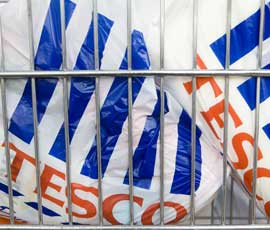Legal action considered over horsemeat scandal

Scandal-hit retailers have been given until Friday (18 January) to explain how horsemeat ended up in beefburgers sold by major supermarkets.
The Food Standards Agency update said it was considering legal action after tests revealed horse and pig DNA in beef products sold in the UK and Ireland.
As part of their investigation, agency officials met meat industry representatives – including producers, processors and retailers – on Wednesday (16 January).
Beef products that tested positive for horse DNA were on sale in Tesco, Lidl, Aldi, Iceland and Irish retailer Dunnes Stores.
The tests were carried out by the Food Standards Authority of Ireland.
The rogue products were produced by three processing plants – Liffey Meats and Silvercrest Foods in Ireland, and Dalepak Hambleton in the UK.
The meeting explored the circumstances that could have led to a number of beef products on sale in the UK and the Republic of Ireland containing traces of horse and pig DNA.
Industry representatives insisted they followed strict procedures to ensure that the products reaching consumers are of the highest standards.
In the case of beefburgers sold by Tesco, horsemeat accounted for 29% of the meat content. In other cases, levels of horse and pig DNA were much lower.
The Food Standards Agency investigation is focusing on the causes of the problem, which officials believe differ depending on the level of contamination.
A four-point plan will be implemented by the agency in conjunction with other government departments, local authorities and the food industry.
Retailers and UK processor Dalepak have been asked to provide comprehensive information on the traceability of the products by the end of Friday (18 January).
The agency will also work with the Irish food safety authority to understand more clearly the factors that may have led to the low-level cases of cross-contamination.
It will also consider whether any legal action is appropriate, while working with DEFRA on a UK-wide study examining the authenticity in processed meat products.
A total of 27 beefburger products were analysed, with 10 of the 27 products (37%) testing positive for horse DNA and 23 (85%) testing positive for pig DNA.
In addition, 31 beef meal products (cottage pie, beef curry pie, lasagne, etc) were analysed, of which 21 tested positive for pig DNA. All were negative for horse DNA.
All 19 salami products analysed tested negative for horse DNA.
Traces of horse DNA were also detected in batches of raw ingredients, including some imported from the Netherlands and Spain.
